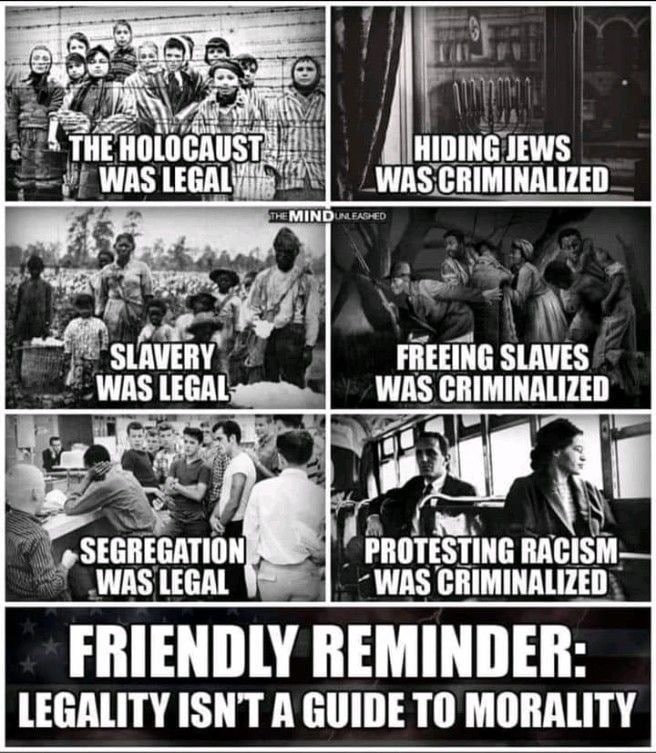
What is even the difference between morals and ethics?
They are so closely tied together the two terms are often used synonymously, but there are some distinct differences. To highlight the differences I'd like to pose several philosophical questions in which a person could find themselves to be morally correct but ethically wrong, or vice versa.
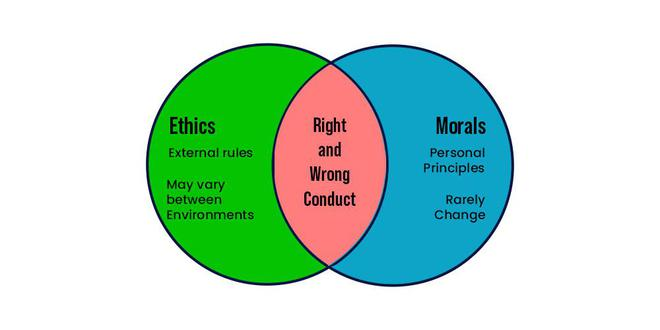
This simple Venn-Diagram...
Here we are shown that a "moral compass" can be more singular and personal in nature, while ethics are classified as rules laid down by society or even a specific geographical culture. When considering this definition, ethics would be more closely tied to the legal system than morality would be. And we all know there are many laws on the books that lead to extremely immoral behavior, just like moral behavior can be illegal during extreme periods of historical strife. Just ask a Lawful Evil archetype like a fatcat banker, or a Chaotic Good person who refuses to follow the rules of others.
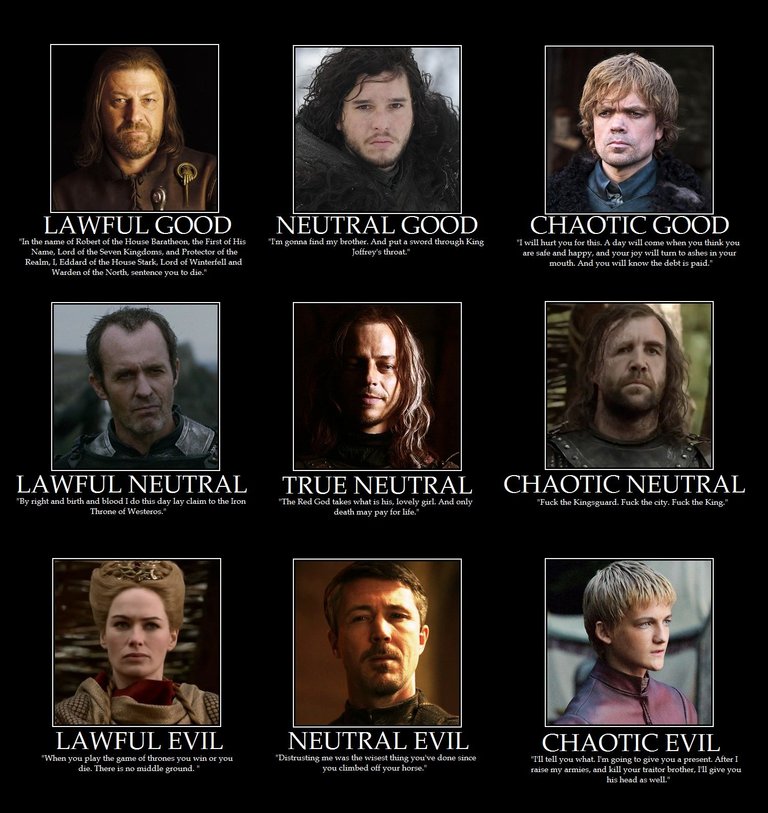
Stealing to Feed your Family:
Certainly the most popular philosophical question out there in regard to the ethics debacle is stealing to feed your family. The devil is in the details. Ideally one would never have to steal; that would be unethical. Stealing is bad. However there are exceptions to the rule.
Allowing people to literally die because you refused to break the rules is arguably even worse than breaking the rules... especially if there is very little consequence to the victim (in this case a vendor selling bread). More often than not the examples always end up finding themselves between a rock in a hard place with no good options left to choose.
Would you rather...
In fact there are even stories during the era of Greek city-states of Sparta forcing their children to steal food to feed themselves to "make them stronger" because they were chronically underfed. What would happen when they were caught stealing? They'd be beaten and/or punished severely. So the lesson in Sparta was not "stealing is bad" but rather "only the strong survive" and "don't get caught". Pretty metal if you ask me.

Okay so maybe I was wrong
The trolley problem is perhaps even more famous than stealing bread to feed the starving. In this scenario you are standing at the trolley junction with a lever in front of you. If you do nothing five people tied to the tracks will die, but if you pull the lever one person will die. There are MANY variants of this question like who the people are (children/criminals/redheads) but the base case is nondescript.
If you pull the lever four less people will die, but also it means that you personally made a conscious decision to kill that other person with your actions. If you do nothing this could also be argued as making a decision, but that path is up for debate because you didn't actually do anything and people die all the time in this world for all kinds of reasons. What personal responsibility do we have to make such a decision?
A case can be made that pulling the lever could be the moral thing to do but also highly unethical because the action taken led to a death. Of course this philosophical quandary is so popular it's been meme'd into the ground and even forged into morbid jokes on several occasions.
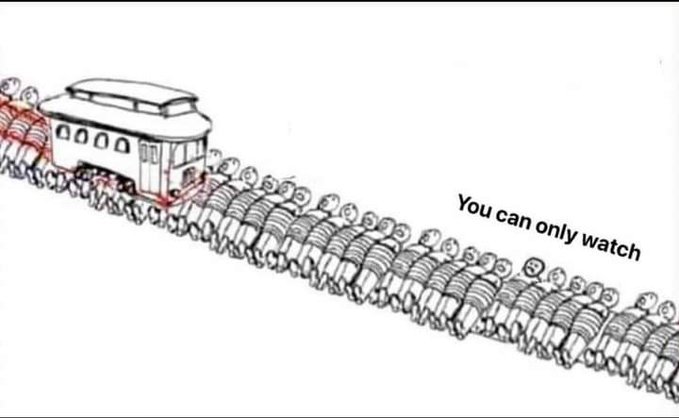
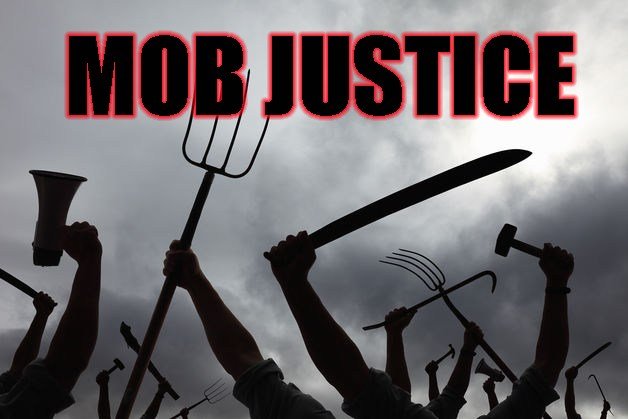
Vigilante Justice:
People love when the "bad guy" gets what they deserve. It is the foundation of many storylines and forms of entertainment. Maybe it's because deep down they know that evil wins quite often and they want to live in a false reality where that is not the case.
Vigilante Justice, or the act of taking the law into your own hands, is illegal and unethical, but is often highly celebrated by the general public. Mob justice has a lot of public support, especially when the victim is a child and the criminal is a pedophile or murderer. It's very easy to morally justify this type of justice on a personal level, but it is always a highly unethical action.

Lying to Protect Someone's Feelings:
This one is pretty universal and happens all the time.
Lying is unethical but also socially expected in many situations.
Because of this social expectation there's a good chance this is backwards.
Lying in these cases would be immoral but ethical based on the culture we live in.
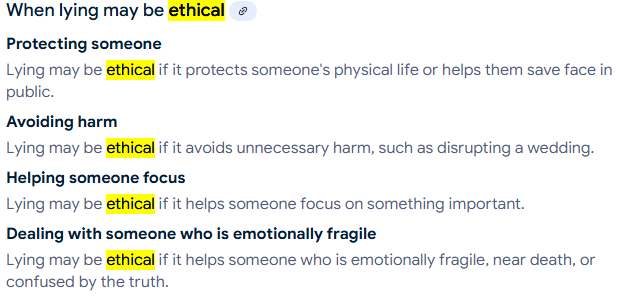
Doctor/Patient Confidentiality
In this same vein it would also be morally wrong for a therapist to promise all their clients that their secrets are contained within a safe space to talk about. However, breaking this confidentiality is not only ethical when the patient poses a risk to themselves or others, but is also required by law. This is another example of how a law on the books can force someone to be immoral because the "ends justify the means" and "it's for the greater good". Whether that is actually the truth is debatable case by case.

Morality is subjective
Many people seem to think that morality is universal across all cultures, religions, and individuals. Thou shall not kill! However, this is not the case. The logic begins to completely breakdown when looked at through a skeptic lens.
These concepts of "good" and "evil" are completely subjective in certain situations. This is because humans have an innate tendency to conflate "pain" with "evil". If something is "painful" it must be "evil" because I don't like experiencing pain! Yes well, sometimes pain is necessary for growth and evolution. Sometimes you kill half of the deer in the forest so that all of them don't starve to death. These things are not black and white, but people like to pretend that they are with a cringeworthy level of false moral authority.
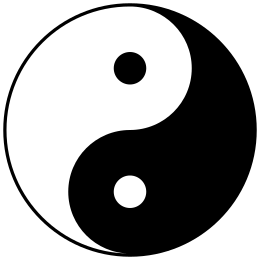
Scope
As a final thought I'd like to point out that the scope of morality is much bigger than the ethical one. Usually when someone is being immoral it is considered "worse" than being unethical. The outlier examples above don't really apply to this, but the big ones are much more obvious. Obviously killing someone is terrible while something like false advertising is much more palatable and understandable in the modern world that we live in.

Conclusion
Doing the right thing and doing the popular thing are often complete opposites of the spectrum. Is this a morality problem or an ethical one? It very much depends on the specifics. However, if we were going to remember one thing about this topic it's that a person's individual moral compass can easily clash against society's ethical standards.
The less I trust the legal system, the less of a problem I have with vigilantism.
You buy the ticket and somebody punches it for you; I'm not going to lose any sleep over that. Don't buy tickets and you'll probably be fine.
Both societal ethics and personal morality can be in error, even when the two agree.
I am determined to continue to study on matters, as I find I have often learned things that prove me wrong, and then I am compelled to change my mind to I won't be wrong anymore. Ethics don't seem to work that way, but to be pushed by a sort of gang mentality, and whoever has the most vocal followers tends to push their ethics to the forefront. Ethics tend to be variable in democracies, going whichever way the wind blows.
While I pay a price for it when I do, I stick with my morals where they conflict with ethics, and that includes when I change my mind after having been proved wrong. What matters to me is doing what is right, while ethics often seems to be doing what others won't condemn you for. I'd rather be condemned for doing what is right than praised for doing what is wrong.
Thanks!
I guess I forgot to mention that we should be aligning morals and ethics so they have less conflict.
I would that it were so, but having watched the left and the right swap places regarding censorship, oppressive national security surveillance, and pandering to corporations since the 1980s, I have strong doubts that could be possible.
It'd be nice, but a lot of folks seem to have little in the way of morals, and neither any personal dedication to ethics, but are willing to just go along with the crowd, whichever crowd they latch onto.
Sometimes it's the justification of the action that eliminates it from being wrong. It is also the society that establishes what is ethical and moral. In short what has been approved and accepted by the many then that is the ethical and moral.
I was actually just talking to my wife about something similar to this over the weekend. I had planned to write a post about it, but I will probably push it out for a bit. It wasn't anything quite as deep as this, but I have a decision I need to make and I know it isn't going to be popular, but it has to be made anyway. If it were a popularity contest, it is a no win situation. I've known folks who poached deer in the past, but it was literally the only way they could feed their family, so nobody bothered to report it.
Morality in the broad strokes approaches the universal, CS Lewis is a thoughtful read here.
The Ethics or the "Nicomachean Ethics" by Aristotle along with "Politics" is a foundational read here.
https://classics.mit.edu/Aristotle/nicomachaen.html
The classical virtues - "arete" are worth a study.
This passage from the Ethics is always good for a laugh (I'll fix the quote when I'm at the computer) Aristotle perhaps would have been dubious about Elon Musk's "Big Balls"
"Now each man judges well the things he knows, and of these he is a good judge. And so the man who has been educated in a subject is a good judge of that subject, and the man who has received an all-round education is a good judge in general. Hence a young man is not a proper hearer of lectures on political science; for he is inexperienced in the actions that occur in life, but its discussions start from these and are about these; and, further, since he tends to follow his passions, his study will be vain and unprofitable, because the end aimed at is not knowledge but action. And it makes no difference whether he is young in years or youthful in character; the defect does not depend on time, but on his living, and pursuing each successive object, as passion directs. For to such persons, as to the incontinent, knowledge brings no profit; but to those who desire and act in accordance with a rational principle knowledge about such matters will be of great benefit. "
Plato was a pupil of Socrates, while Aristotle was a pupil of Plato. Seems Aristotle discounts his own argument, disagreeing with his aged, wise master. I have agreed with Plato all my days. For good or ill, acting on my principles suits me.
I am uneasy with any that don't.
CNN gave me a bellyful of laughs with this pic.
Thanks!
Socrates asked uncomfortable questions, and they had him drink hemlock.
Plato was too enamored with wife-swapping and the Lacedaemonians (from The Republic).
Socrates was a soldier and by romanticized accounts down-right scary.
As Plato said though we do have to go down to the Piraeus to be of any use. You can opine about the nature of the seed in winter, but come spring if you don't dig a hole and put it in the dirt, it will be a hungry year.
Such practical considerations is why I tend to fall into the Platonic camp, at least in such respects. I am decidedly less a fan of his personal relationship style, but that's certainly a far more personal sort of moral and ethical consideration.
It is difficult to do something that is right but it is not ethical approach
The measures to identify whether a specific action is morally right or wrong depends on the society and the culture it has
Little white lies is somewhat Ok? depends on the situation and what is being said..
don't get caught; survival of the fittest!
😉😎🤙
!PIZZA